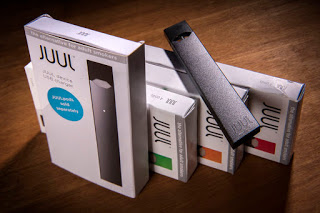Juul stops all ads, gets a new CEO, and says it won’t lobby on proposed ban of most electronic-cigarette flavorings

(Photo by Bill O’Leary, The Washington Post)
—–
The leading manufacturer of electronic cigarettes, Juul Labs, suspended advertising its products Wednesday, Sept. 25, and said “its chief executive officer is stepping down and will be succeeded by a top official from Altria Group,” which owns 35 percent of Juul, reports Laurie McGinley of The Washington Post.
At a congressional hearing, acting FDA Commissioner Norman “Ned” Sharpless said “In retrospect, the agency should have acted sooner” against e-cigarettes. “Sharpless said earlier data had suggested that youth vaping was declining and noted the agency has issued thousands of warning letters and penalties involving underage sales in the past year and a half,” McGinley reports.
“Juul, under pressure from the FDA, stopped selling many of its flavored products in retail settings late last year. But it still sells mint and menthol flavors in stores — and recent data showed that those products have become increasingly popular among young people. The policy outlined by the FDA and the White House earlier this month would include mint and menthol flavors, as well as sweet and fruity ones, and cut Juul sales by 80 percent, according to estimates.”